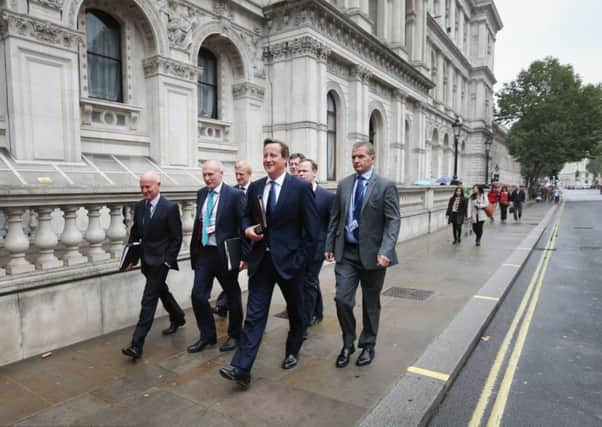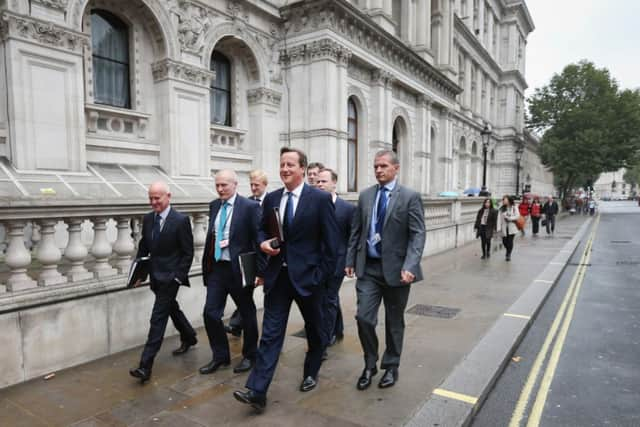David Cameron’s anti-terror measures stumble


David Cameron told MPs police will be given powers to seize passports from UK nationals suspected of going to fight for Islamic State (IS) in Iraq or Syria.
The Prime Minister said officials were also “working up” proposals to bar British extremists from returning to this country, and signalled he wanted to beef up terrorism prevention and investigation measures (Tpims).
Advertisement
Hide AdAdvertisement
Hide AdHowever, Downing Street later admitted there was as yet no timetable for introducing legislation, and they were not certain excluding Britons from the country would be possible.


Meanwhile, the Liberal Democrats insisted they had not “definitively” signed up to bolstering Tpims by allowing suspects to be relocated.
Senior coalition figures have been engaged in detailed negotiations about the package of measures over the weekend, after the UK’s terrorist threat level was raised from substantial to severe.
Addressing the Commons yesterday, Mr Cameron said thousands of European citizens had gone to fight for IS and there were growing fears about the potential for them to return and wreak havoc.
“Adhering to British values is not an option or a choice,” he said.
“Passports are not an automatic right. The Home Secretary already has the discretion to issue, revoke and refuse passports under the royal prerogative if there is reason to believe people are planning to take part in terrorist-related activity.
“But when police suspect a traveller at the border, they are not currently able to apply for the royal prerogative and so only have limited stop-and-search powers.
“We will introduce specific and targeted legislation to fill this gap by providing the police with a temporary power to seize a passport at the border, during which time they will be able to investigate the individual concerned.
Advertisement
Hide AdAdvertisement
Hide Ad“This power will include appropriate safeguards and oversight arrangements.”
The premier said it was “abhorrent” that British citizens who pledged allegiance elsewhere were able to return to the UK and pose a threat to national security.
“We are clear in principle that what we need is a targeted discretionary power to allow us to exclude British nationals from the UK and we’ll work proposals on this basis with our agencies in line with our international obligations and discuss the details on a cross-party basis,” he added.
“We will introduce new powers to add to our existing terrorism prevention and investigation measures including stronger locational constraints on suspects under Tpims either through enhanced use of exclusions zones or through relocation powers.”
Airlines will also be hit by tougher rules, including providing information on passenger lists, or their flights will be blocked from landing in the UK.
But Mr Cameron dismissed London mayor Boris Johnson’s call for a presumption that travel to certain countries was for criminal purposes, describing the idea as “wrong”.
Labour branded the suggestion of barring suspected jihadists from coming back to this country “vague” and “unclear”.
Former attorney general Dominic Grieve warned it was “probably impossible” to enforce.
Advertisement
Hide AdAdvertisement
Hide Ad“Whilst the person who goes abroad fighting in Syria may technically commit treason, and indeed should be put on trial perhaps for treason when they come back, nevertheless they are British nationals and excluding them unconvicted from coming to this country I think raises some very severe difficulties,” the Tory MP told BBC Radio 4’s PM programme.
Ed Miliband pointed out that relocation powers were a central part of the control order system previously scrapped by the coalition in favour of Tpims.
“With regards to the most serious high risk cases where convictions in the courts cannot be achieved I welcome your recognition that the Independent Reviewer on terrorism had made clear the inadequacies of Tpims,” he said.
“In particular the inability to relocate suspects away from their communities.
“Relocation was indeed a central part of control orders and it was a mistake to get rid of them in the first place.”
Mr Miliband also urged the Government to introduce a “mandatory and comprehensive” programme to deradicalise both terror suspects and those who have been “on the fringes” of extremism in Iraq and Syria.
He criticised ministers for making the Prevent counter-terrorism strategy “overly focused” on the police response to terrorism, rather than parents and communities.
Deputy Prime Minister Nick Clegg insisted discussions on the measures had not “divided the coalition”.
Advertisement
Hide AdAdvertisement
Hide Ad“This was not an argument that divided the coalition. Both the PM and myself want to get the right balance between plugging the gaps where they need to be plugged to make sure that we keep people in this country safe, but doing so in a way that is in keeping with our finest traditions of due process and upholding the rule of law,” he said.
But a senior Lib Dem source made clear the extension of Tpims was not a done deal.
“We have not definitively signed up to introducing relocation powers. We have agreed to look in detail at the options available to us,” the source said.
Downing Street said the plans for seizing passports, excluding British nationals and toughening TPIMS would all require legislation.
The PM’s spokesman said the changes would be brought forward “as swiftly as possible” although he declined to speculate on whether it would be this year.
He also rejected the idea that the Government was U-turning by re-introducing locational restriction, arguing that there were still significant differences between Tpims and the old control order regime.
Mr Cameron was repeatedly pressed by MPs over whether Britain would be willing to join a “coalition of the willing” to take military action against IS.
The premier refused completely to rule out taking part in air strikes, saying: “We should use all those things that we have at our disposal but recognise there isn’t some unique military solution that can be put in place.”